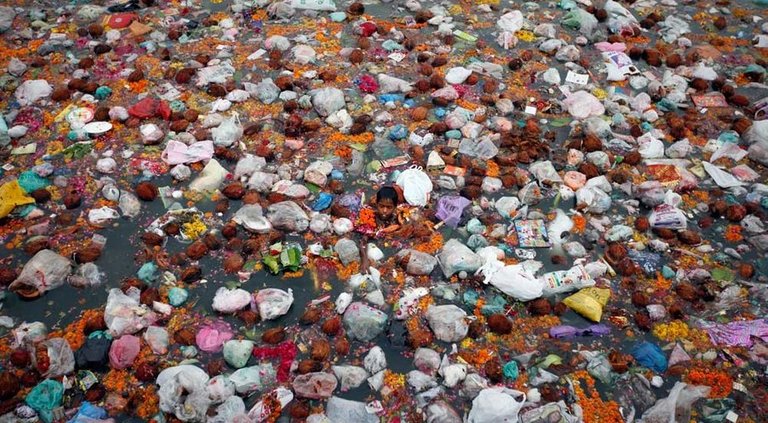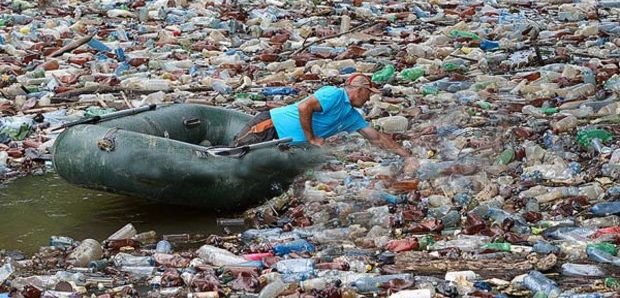
Plastic pollution: a topic that has taken the media by storm. It has been dubbed a “planetary crisis” and a “planetary emergency”. It is estimated that 8 million tonnes of plastic ending up in our oceans every year. If plastic continues to be dumped at its current rate, the oceans will carry more plastic than fish by 2050. We have as many as 51 trillion microplastic particles in our oceans — that's 500 times more than stars in our galaxy! We ingest plastic every time we eat seafood — one reason why I've stopped eating seafood.
The deluge of such news is not only depressing, it makes one feel hopeless. It looks as though despite all our efforts, we are hardly making a dent in the big scheme of things.
Undoubtedly, mindless, apathetic consumerism is part of the issue. And while we do have the power to vote with our wallets, focusing solely on consumers relieves corporations and governments of all responsibility, making it our cross to bear and ours alone. It cannot and should not be this way. We do not have the luxury of time on our side. We need to act with greater urgency and adopt a top-down approach as well. Bringing our own reusable bag does not go very far when most products are packaged in plastic!

Large corporations ought to be held responsible for their choices and actions. Governments need to step in by changing their policies, pressuring businesses to change. France recently became the first country to ban plastic cups, plates and cutlery. This new law ensures all disposable cups, cutlery and plates are made of biologically-sourced materials and can be composted. We need more governments to take giant leaps like this. This top-down approach is what is necessary to create sweeping changes, tackling climate change at a much faster pace. We no longer have time for baby steps.
Unfortunately, in countries like the U.S, if plastic bags were to be banned (as they were in Kenya earlier this year), it would become a legal battle requiring copious amounts of money to fight the plastic industry, most notably the American Progressive Bag Alliance – a pro-plastic lobby group run by the American Chemistry Council. This group is the moneybag behind legislation to ban the banning of plastic bags. In the documentary, Plastic Patch: The Great Pacific Garbage Patch, journalist Angela Sun revealed that this council is an umbrella organization for Dow Chemical Company, DuPont and ExxonMobil.
Getting rid of plastic isn't easy. Different kinds of plastic can degrade at different times, but the average time for a plastic bottle to completely degrade is at least 450 years; some may take up to 1,000 years to biodegrade. Burning these plastics can release dioxins. Dioxins are also unavoidably produced during the manufacture of materials containing chlorine, including PVC and other chlorinated plastic feedstocks.
Dioxin is a known human carcinogen and the most potent synthetic carcinogen ever tested in laboratory animals. A characterization by the National Institute of Standards and Technology of cancer causing potential evaluated dioxin as over 10,000 times more potent than the next highest chemical (diethanol amine), half a million times more than arsenic and a million or more times greater than all others. And we wonder why cancer rates are rising exponentially.... We have plastic in the air, in our landfills, and in our oceans. How is it possible for us to eat healthy if all our food and water sources, even the very air we breathe, are contaminated with carcinogens and microplastic???
According to the World Health Organisation, “Once dioxins have entered the environment or body, they are there to stay due to their uncanny ability to dissolve in fats and to their rock-solid chemical stability.”
However hopeless it might seem in the face of all the negativity in the media, we have to make our voices heard, for fools multiply when wise men are silent -- especially when we have leaders who are only looking after their self-interests. Even if you are not an environmentalist or a conservationist; even if you do not give a hoot about plastic polluting our ocean and killing wildlife, surely, you care about your health. Plastics enter our food chain, leaching toxins into our food and water; they disrupt our hormones and cause cancer - that should be cause enough for everyone to worry and lobby their governments to review legislation on the use of plastic. We must bear in mind that an unhealthy planet simply cannot produce healthy food.
A new year means another chance to make a difference. This coming year, let us all start by giving up bottled water, and then lobby just one corporation and/or our government to do something about the plastic crisis.
The impact of food and water on our health hits much closer to home for most people — even those who are not environmentalists or conservationists would have to start caring about plastic polluting our planet and poisoning our food and water. It is time to get more people on board, albeit from a different vantage point, towards the same goal.
Healthy planet, healthy food, a healthy you.
#healthyplanethealthyfood
If you would like to get in on this, please send me a message.
Hi! I am a robot. I just upvoted you! I found similar content that readers might be interested in:
https://www.ecowatch.com/plastic-made-illegal-2509110321.html
Hi !!
Nice to meet you! We are currently trying to create a Steemit community for fellow Singaporeans.
Inspired by what other countries had done (teamaustralia, teammalaysia, etc), a community will help Singapore Steemians to grow together. We can share ideas, collaborate efforts and learn from each other.
If you are interested, feel free to join this newly created Facebook group and unite together! https://www.facebook.com/groups/steemsingapore/ Hope to see you participate in this community! #teamsingapore